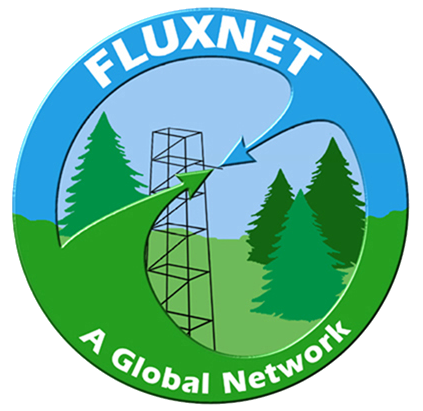Workshop Report: Fostering collaboration and support for the next generation scientists in the flux community through a Three-Day Multi-Session Online Workshop
by: FLUXNET Early Career Network; Frederick Otu-Larbi, Hojin Lee, Theresia Yazbeck, Youmi Oh, André Luís Diniz dos Santos, Xiangmin Sun, Caleb Mensah, and Gabriela Shirkey
Overview of Workshop
To serve the needs of a growing, international early career community in FLUXNET, the Early Career Network (ECN) held a virtual, three-day workshop July 31 to Aug 2, 2023 titled Fostering collaboration and support for the next generation scientists in the flux community through a Three-Day Multi-Session Online Workshop. The overarching goal of the workshop was to promote development and connection between the FLUXNET-ECN and regional network leaders with a focus on serving the underrepresented early-career community in Africa, Southern Asia, and Latin America. Topics covered included instrumentation and field site design, data analysis and processing protocols, and applications of flux data. On each day of the workshop, sessions were repeated in the morning across three time zones—Americas & Caribbean, Asia & Oceania, and Europe & Africa—to accommodate localized schedules and increase participation amongst experts and participants in these regional networks. To ensure access to guest speakers post-webinar and across regions, additional interactions were held over Slack and speakers agreed to serve as potential mentors. This workshop served an emerging need to accommodate regional diversity and accessibility to FLUXNET mentors and materials. In this workshop report, we provide the workshop logistics, performance metrics, and additional feedback from participants for future FLUXNET initiatives in education and mentorship.
Workshop Products and Results
The virtual workshop successfully brought together 338 participants from global FLUXNET regional networks to foster learning, collaboration, exchange ideas, and address challenges in the flux community. The immediate product delivered during this workshop were daily educational sessions live-presented in each time zone by different speakers local to those regions. This also resulted in multiple recorded presentations that are regionally representative and available for global viewership if the community wishes to learn further. The secondary product was a platform to engage attendees post-webinars and across regional networks. A third and final product are survey results of participants to elucidate any further needs from the early career community that should be addressed by FLUXNET in future initiatives. Further, this workshop demonstrated a new, innovative framework to host a global workshop that is inclusive and accommodating to regional needs by creating platforms for live interactions with mentors during and after presentations and opportunities for feedback on remaining needs or concerns.
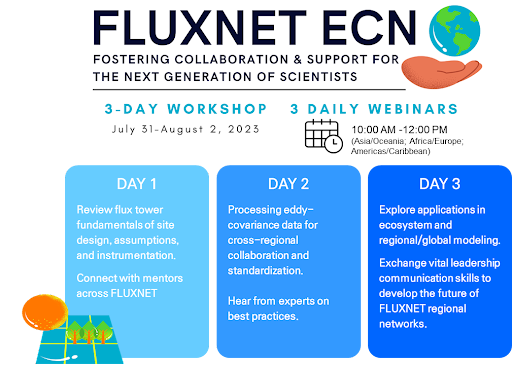
Figure 1. Workshop advertisement shared on social media, email lists, and in a poster presentation at the FLUXNET Annual Meeting 2023.
Product 1: Live and recorded materials for educational outreach
Review of flux tower site design and instrumentation was the focus of the workshop on Day one (July 31st). Dr. Marcy Litvak and Dr. Paul Stoy (Americas & Caribbean), Dr. Gerardo Fratini and Dr. Natalia Kowalska (Europe & Africa), and Dr. Minseok Kang and Dr. Yin Wang (Asia & Oceania) led the presentations and discussions on how to set up a fluxsite and shared their experiences about setting up and running eddy covariance instruments with participants. Dr. Justine Missik, Dr. Claire Lunch, and Dr. Jiahong Li (Americas & Caribbean), Dr. Ladislav Šigut (Europe & Africa), and Dr. Yusri Yusup and Dr. Peter Isaac (Asia & Oceania) were the resource persons for Day Two (August 01). Presentations and discussions focused on how to process eddy covariance data as well as cross-regional collaboration and standardization. Various softwares and processing tools were introduced and demonstrated to workshop participants. The final day of the workshop was dedicated to applications of eddy-covariance data in ecosystem and regional/global modeling and vital leadership communication skills to develop the FLUXNET regional networks. Dr. Housen Chu, Dr. Stefan Metzger, and Dr. Enrico Yepez Americas & Caribbean), Dr. Pascal Boeckx and Dr. Michal V. Marek (Europe & Africa), and Dr. Shuli Niu, Dr. Anna Ukkola, and Dr. Kazuhito Ichii (Asia & Oceania) shared their experiences in using eddy covariance for various applications with workshop attendees.
Sessions were held through the Zoom platform with the support of Dr. Christin Beuchner and helped set up the registration and zoom links. Each session was well attended and involved lively discussions after presentations by invited speakers and participants (Table 1). Since posting the recordings, the accumulated views have reached 500 within one month. The list of registrants could be found in the Appendix. After the 3-day workshop, recorded videos have been uploaded to the Ameriflux YouTube channel (https://www.youtube.com/@AmeriFlux), and are accessible to a wider audience. Below are the corresponding links for all the session across all timezones:
Table 1. Daily workshop recordings and live attendance across the three time zones.
| Workshop Day | Time zone | Recording Link | Attendance |
|---|---|---|---|
| Day 1 | Asia/Oceania | https://youtu.be/_eRpWtGpNHo | 34 |
| Day 1 | Africa/Europe | https://youtu.be/cmQwi_mLbTw | 28 |
| Day 1 | America/Caribbean | https://youtu.be/rCKEOm5-o3A | 31 |
| Day 2 | Asia/Oceania | https://www.youtube.com/watch?v=PfDpg1DWE9c | 44 |
| Day 2 | Africa/Europe | https://youtu.be/LiVJ8-BqmmM | 31 |
| Day 2 | America/Caribbean | https://www.youtube.com/watch?v=9BO7zaVVp8c | 33 |
| Day 3 | Asia/Oceania | https://youtu.be/CKlULxiLRt0 | 46 |
| Day 3 | Africa/Europe | https://youtu.be/PnL6dn-9JEY | 49 |
| Day 3 | America/Caribbean | https://youtu.be/WSkqexsRz5Y | 42 |
Product 2: Slack Channel
An event-dedicated Slack channel was created to foster inter-regional collaboration and mentor-mentee interactions. Ninety-two people joined the conversation on Slack, with 1328 messages being sent so far. During the workshop, participants engaged in a conversation about various environmental measurement topics in the “workshop-day1” channel. They shared information and asked questions while panelists offered their presentation slides and answered inquiries. The discussion covered specific sensor uses, aligning anemometers/analyzers on a tower, evaluating the impact of towers and slopes on measurements, and lightning protection. Participants also discussed Eddy Covariance’s books and shared literature recommendations. The conversation revolved around environmental measurement topics, with participants exchanging information and insights. During the second day of the workshop, the participants in the “workshop-day2” channel were able to access the panelist’s presentation slides and connect with senior researchers who are working on data processing topics. On the third day, the panelists shared their presentation slides and answered questions related to scientific research matters. It was observed that the instrumentation topic had the highest participation and interaction in the FLUXNET-ECN community workshop dedicated to Slack channels during this specific workshop.
Mentor/Mentee Interaction and Discussion
The workshop live sessions followed by conversations through Slack helped create a comfortable platform for attendees to ask questions and open discussions that could be hardly discussed in typical webinars where a presentation would be followed by questions and ends by the end of the webinar. Slack channels allowed mentors to share different resources with attendees, explain some detailed questions participants had after attending the session and go through the resources shared with them. Some of these questions involved logistical issues in setting up towers, which reference to use, type of instruments, how to account for land characteristics (homogeneity, topography…). The open discussion during the week of the workshop is what made it special and having it extended over one week gave time to participants to grasp all the information they want and learn as much as possible for all experienced speakers who volunteered their time to support our workshop.
Survey following-up and Future prospects:
A survey was sent to the workshop attendees in order to get back their feedback and what they would suggest for future workshops. The workshop’s participants are from different career stages with a focus on graduate students who accounted for 58% of the total participants. All who filled out the survey were satisfied or highly satisfied, and would like to attend such workshops in the future. Suggestions were very diverse. Many suggested adding new topics like machine learning, carbon credits, BVOC and N2O monitoring, modeling, and remote sensing application. Others would like to go over more basic materials regarding eddy covariance and data processing. Based on these answers, we would recommend to organize later on different workshops targeting different career stages, where one workshop would be dedicated for beginners who would like to know more about the basics of eddy-covariance and data processing, and another workshop (held in parallel and at a different time) for more advanced people who have already worked with EC data and would like to know more about the wider applications of this technique and how to couple it with other advanced tools like machine learning and remote sensing.
Conclusions and Recommendations
The three-day virtual workshop successfully facilitated learning experiences for early career members in the flux community. Through tailored parallel sessions, attendees gained localized insights, shared expertise, and identified avenues for joint ventures. We highly recommend to keep organizing such workshops seeing the high level of satisfaction that participants expressed and the active involvement and interactions that were present between the speakers and attendees. The Slack channel showed to be a very successful platform for after-sessions discussions and highly recommended for future workshops.
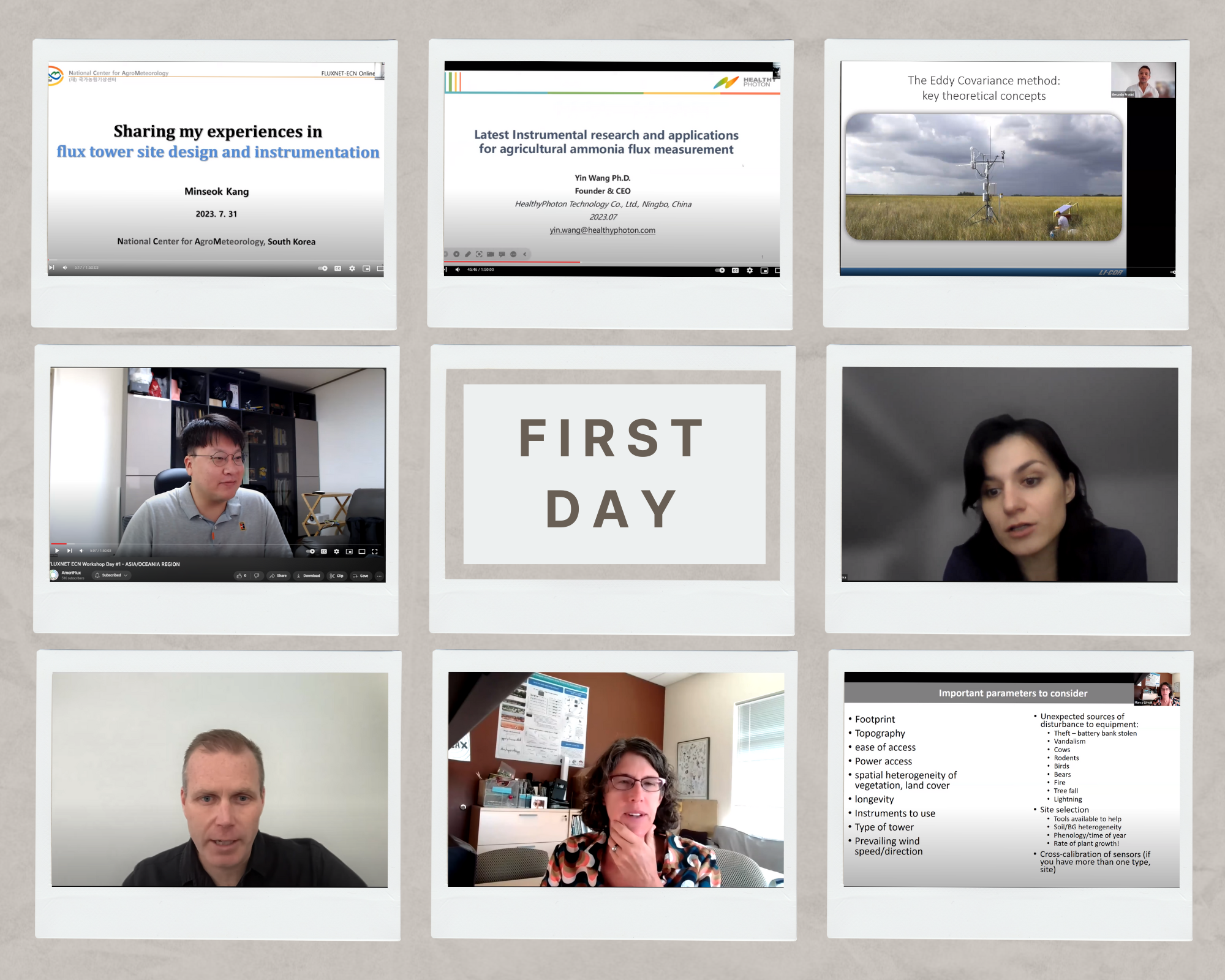
Figure: Photo collage from first day of workshop
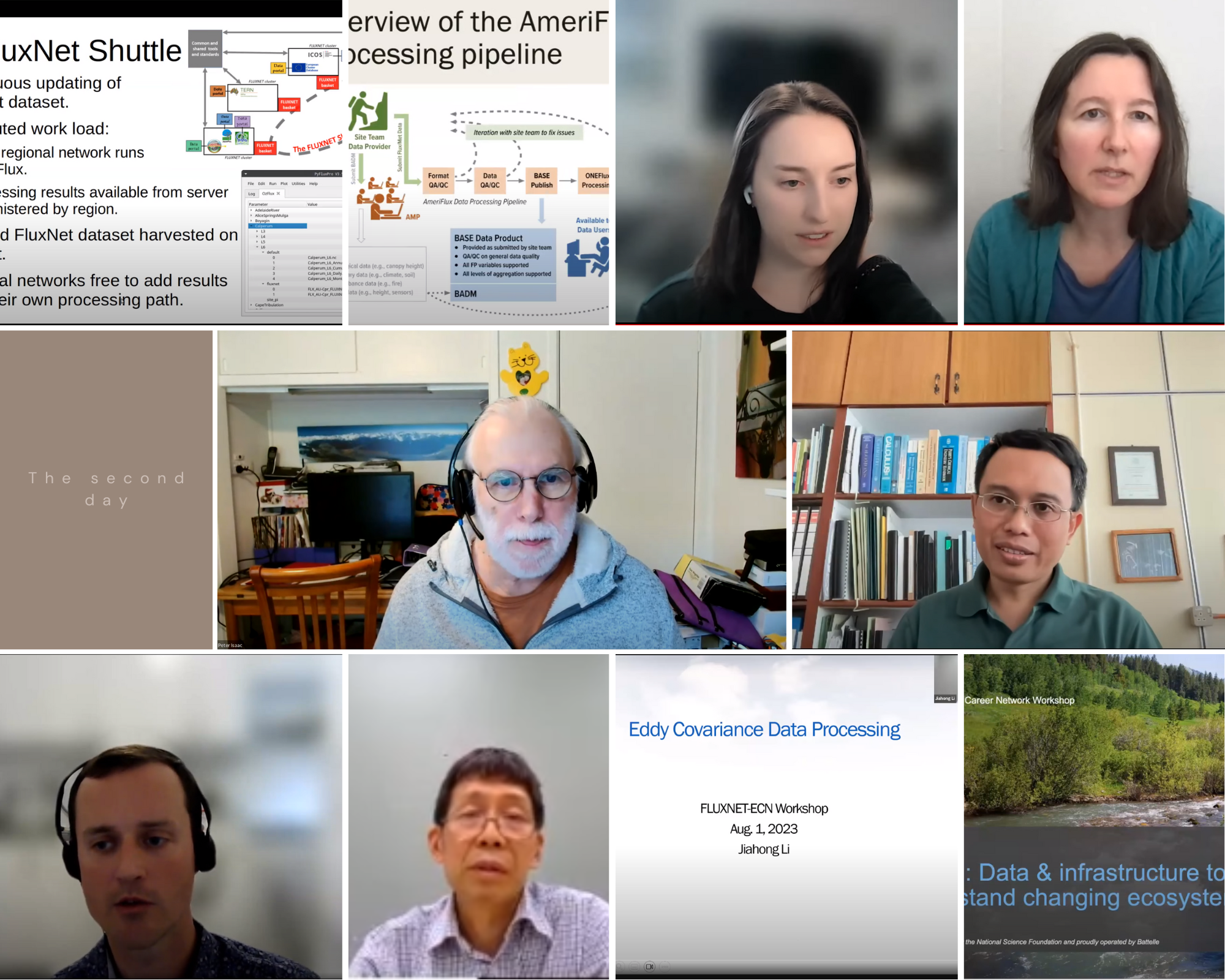
Figure: Photo collage from second day of workshop
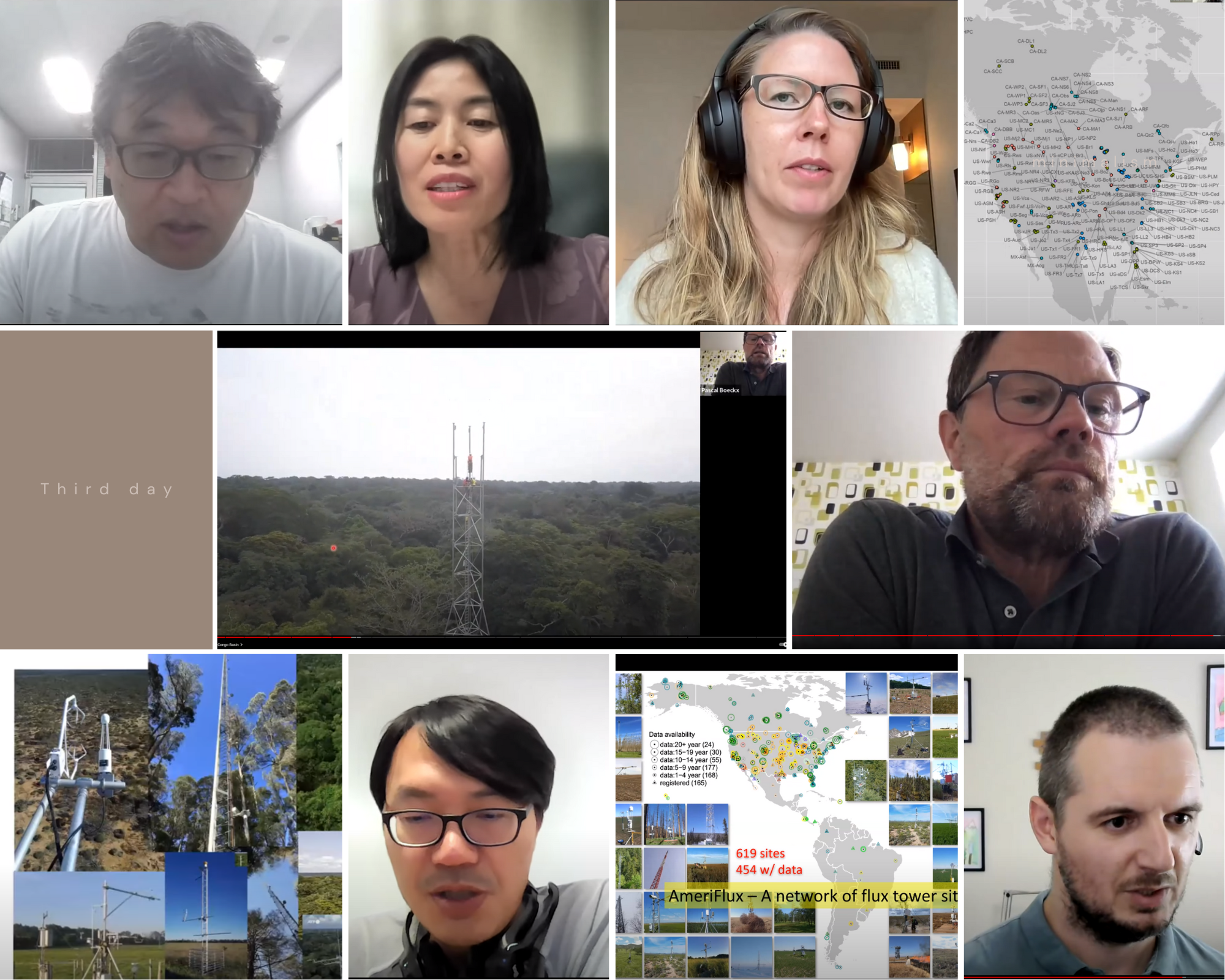
Figure: Photo collage from third day of workshop
